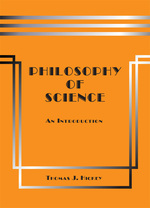Purchase the ebook for easy and immediate reading.
Purchase the print book for easy reading (3rd party vendor).
Purchase the audiobook for easy listening.
 This concise and accessible book is a synthesis of the basic principles of the contemporary realistic neopragmatist philosophy of science. It discusses the aim of basic science, the methods of scientific discovery, the criteria for scientific criticism, and the nature of scientific explanation. Included is a description of a newly emergent specialty called computational philosophy of science, in which computerized discovery systems create and test new scientific theories.
This concise and accessible book is a synthesis of the basic principles of the contemporary realistic neopragmatist philosophy of science. It discusses the aim of basic science, the methods of scientific discovery, the criteria for scientific criticism, and the nature of scientific explanation. Included is a description of a newly emergent specialty called computational philosophy of science, in which computerized discovery systems create and test new scientific theories.We have been providing authors and small presses with ebook publishing and book marketing services since 2010. We offer ebook publishing (creation, formatting, distribution), print on demand services, audiobook creation, editing/proofreading, book/author websites, and book marketing and promotion services. Please let us know how we can help you!